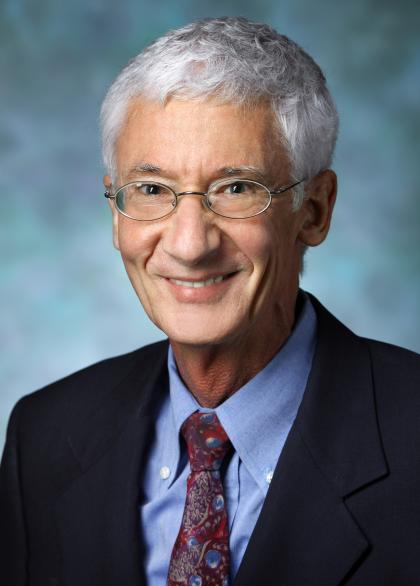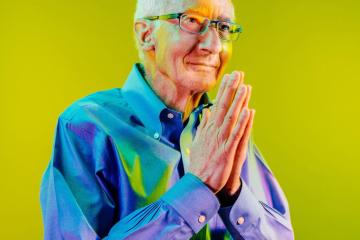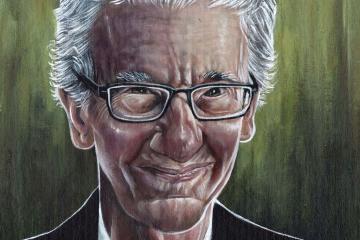Roland Griffiths, an internationally revered researcher of psychedelic and mood-altering drugs, whose research helped kickstart a new era of psychedelic study and led to the creation of the nation's first psychedelic research center, at Johns Hopkins, died on Monday, Oct. 16, at age 77.

Image caption: Roland Griffiths
Griffiths' work generated immense scientific and philanthropic interest, including $17 million in gifts that led to the creation of the Johns Hopkins Center for Psychedelic and Consciousness Research in 2019, where he served as the founding director. He was diagnosed with colon cancer in November 2021.
Groundbreaking studies published by Griffiths and his colleagues found that psilocybin—the active ingredient in so-called magic mushrooms—produced experiences that resulted in substantial and sustained personal meaning, could help treat depression and had therapeutic effects in people who suffer from substance use disorder (smoking, alcohol, and misuse of other drugs) and existential distress caused by life-threatening disease.
In June, David Yaden, a researcher at the center, became the inaugural recipient of the Roland R. Griffiths, Ph.D. Professorship Fund in Psychedelic Research on Secular Spirituality and Well-Being. The $24 million endowed professorship, the largest ever at the Johns Hopkins University School of Medicine, aims to advance research on psychedelic substances and their effects on human health, behavior and worldview. Yaden is an assistant professor of psychiatry and behavioral sciences.
Jimmy Potash, director of the Department of Psychiatry and Behavioral Sciences, credits Griffiths with attracting talented investigators and trainees to the department, in turn helping it become one of the country's top-ranked programs. Potash says Griffiths' earlier pioneering work in psychopharmacology and his reputation as a superb researcher made him the ideal person to take on the controversial study of psychedelic drugs.
Also see
"He was about 50 years old when he plunged into this area, and he had already established himself as a careful, methodical, meticulous investigator, the kind of researcher whose work was unimpeachable," Potash says. "This is what the field needed, as skeptics would be unlikely to trust the work of anyone less rigorous and objective. The other key was that Roland was sure of himself, and unflappable. He knew that all that mattered was what the data told him."
Prior to his work in psychedelic research, Griffiths was already a giant in the field of psychopharmacology and recognized for his seminal research into the psychoactive and dependence-potential properties of caffeine. That work enhanced understanding of caffeine as a model for studying drug dependence, which led to caffeine withdrawal being included in the Diagnostic and Statistical Manual of Mental Disorders (DSM-5), the authoritative guide to the diagnosis in psychiatry and psychology.
Griffiths authored a letter in 2008 signed by nearly 100 scientists and physicians urging the FDA to regulate labeling and caffeine composition of energy drinks. A study published that year in the journal Drug and Alcohol Dependence argued as such, noting that there were increasing reports of caffeine intoxication from energy drinks, and it was likely that problems with caffeine dependence and withdrawal would also increase. Letters and advocacy such as this led to greater FDA regulations when combining caffeine with other products, including the federal ban on prepackaged caffeinated alcoholic drinks.
"Roland's research with caffeine was elegant, systematic and thorough," says Eric Strain, director of the Behavioral Pharmacology Research Unit and a co-author of the 2008 study. "It was not only scientifically impressive, but it also really helped to reveal that there were people who truly struggled to control their caffeine use and, under some circumstances, would go to incredible lengths to get caffeine. His caffeine work alone would be an impressive career for most scientists."
A specialist in the behavioral and subjective effects of mood-altering drugs, including nicotine and sedatives, as well as alcohol self-administration, Griffiths' extensive work in sedative research included studies on long-term use and misuse, and cognitive effects of the drugs. He also served as a consultant to the National Institutes of Health, to numerous pharmaceutical companies in the development of new psychotropic drugs and to the World Health Organization as a member of the Expert Committee on Drug Dependence.
Griffiths' landmark 2006 study, published in Psychopharmacology, demonstrated that a single high dose of psilocybin in medically and psychiatrically healthy participants produced experiences that had substantial personal meaning and spiritual significance, and resulted in sustained positive changes in attitudes and behavior. This study is credited with marking the beginning of a renaissance in psychedelic research, which had been largely dormant since the early 1970s—a number of other prominent institutions began their own psychedelic research ventures around this same time, including New York University and University of California Los Angeles, due to renewed interest and backing from similar funding sources.
In 2020, he and his Johns Hopkins colleagues at the center published a JAMA Psychiatry paper that was the first rigorous controlled study showing that psilocybin-assisted psychotherapy could effectively treat clinical depression. "The first study in 2006 was amazing and revelatory to him with how meaningful and profound an experience it was for the volunteers," says Mary Cosimano, director of guide/facilitator services at the Center for Psychedelic and Consciousness Research. "Over time, study after study, volunteer after volunteer, Roland and the rest of the team observed how powerful this treatment can be, not just spiritually, but therapeutically as well."
Video credit: Oprah Daily's O Talks
Griffiths was also well aware that the use of psychedelics involves risks, and he worked assiduously to characterize them as he observed and measured the benefits.
A clinical researcher at Johns Hopkins for more than 50 years and author of more than 400 journal articles and book chapters, Griffiths' discipline extended to his exercise, his meditation practice and his diet, which he carefully controlled, with the exception of his love for chocolate.
Fred Barrett, director of the Center for Psychedelic and Consciousness Research, notes that when they would write papers together, Griffiths would scrutinize each word and data point to make sure that the report precisely communicated their scientific findings.
"He really challenged me to be as precise in my language as possible, but as audacious as possible in my goals," Barrett says. "Those two things juxtaposed allow for an awful lot of discovery."
Griffiths earned his bachelor's degree at Occidental College in Los Angeles in 1968, and his doctorate in psychology at the University of Minnesota in 1972. Upon graduation, he became an assistant professor in behavioral biology at the Johns Hopkins University School of Medicine and a research associate in the Department of Psychiatry at Johns Hopkins Bayview Medical Center, then known as Baltimore City Hospitals. He was named research chief in 1975.
In the 1990s, Griffiths got deeply involved with the Siddha Yoga meditation community, and began a long-term dedicated practice. He has said it was the first time it got him thinking about his own deep inner experience, and he was intrigued by the altered states of consciousness achieved through meditation. That interest ultimately led him to study psilocybin—which can also cause altered states of consciousness—when the opportunity was presented.
In November 2021, after a routine colonoscopy, doctors diagnosed Griffiths with late stage colon cancer. But he remained himself to the end, drawing on his 25-year meditation practice and his work exploring the depths of the human experience to find beauty, joy and meditative contemplation in the throes of his surprise diagnosis, which he referred to as a "gift" that helped inspire the professorship.
"For me, the psychological off-ramp from potential emotional misery has been the cultivation of gratitude for the precious gift of life itself, of being conscious, awake to the mystery of this present moment," Griffiths said in 2022 in a video about the professorship.
Griffiths is survived by his wife, Marla Weiner; three children from a previous marriage: Sylvie Grahan, Jennie Otis and Morgan Griffiths; and five grandchildren.
To learn more about the Roland R. Griffiths, Ph.D. Professorship Fund in Psychedelic Research on Secular Spirituality and Well-Being, visit the website.
Posted in University News









